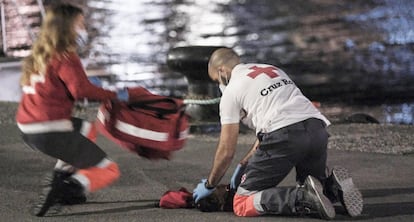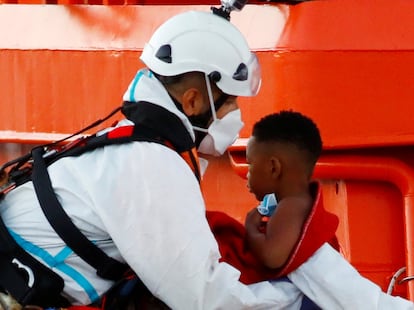Toddler rescued from migrant boat near Canary Islands dies in hospital
The two-year-old from Mali had been revived by emergency workers at the port of Arguineguín after arriving in critical condition, and rushed to intensive care

A two-year-old child from Mali who was rescued at sea on Tuesday in critical condition and resuscitated by emergency workers has died in a hospital in Spain’s Canary Islands.
The toddler was found by Spanish sea rescue services on a boat carrying 29 women, 14 men and nine other children who had been out at sea for days after departing from Dakhla in Western Sahara. Rescue workers said many of the occupants showed signs of hypothermia and dehydration, and eight children had almost lost consciousness.
The two-year-old, whose identity has not been released despite initially being mistakenly identified as “Nabody,” was already unconscious when she was found, and Red Cross workers raced to revive her at the port of Arguineguín, on the island of Gran Canaria. She was then rushed to a children’s hospital in Las Palmas, where she remained in intensive care until her death on Sunday.
Another two-year-old who traveled on the same boat and was also taken to the hospital is now out of the intensive care unit.

Paula Atochero and Miguel Vela, two Red Cross workers who assisted the child at the port of Arguineguín, told EL PAÍS about those critical two or three minutes while they fought to keep her alive until the ambulance arrived. “When I saw her, the first thing I asked myself is ‘Why is life so unfair?’,” explained Vela.
“We placed her on the ground, we put on the gloves we had in our pockets, we snipped off her clothes and we initiated resuscitation,” said Atochero.
Spanish Prime Minister Pedro Sánchez and the main opposition leader, Pablo Casado of the Popular Party (PP), expressed their condolences on Twitter.
“There are no words to describe so much pain. A heartfelt thanks to those who fought to the end to save her life. It is a wake-up call for everyone’s conscience,” tweeted Sánchez, of the Socialist Party (PSOE).
No hay palabras para describir tanto dolor. Gracias, de corazón, a quienes han luchado hasta el final por salvar su vida. Es un aldabonazo en la conciencia de todos nosotros. Nabody tenía 24 meses. https://t.co/UrQ1wDk62g
— Pedro Sánchez (@sanchezcastejon) March 21, 2021
A dangerous route
The toddler is the 19th migrant to die so far this year on the so-called Canary Islands route, a dangerous Atlantic Ocean journey that has become one of the main gateways into Europe following the crackdown on crossings via the Mediterranean.
So far this year 2,950 people have arrived in the Spanish archipelago on vessels departing from the African coast. This figure is twice as high as over the same period last year, although it is far below the September-to-December period, when there were peaks of over 8,000 arrivals a month.
This past week alone sea-rescue services have assisted 356 migrants, of whom three have died and more than 20 have been hospitalized.
PP leader Casado has called for a national pact on immigration that includes efficient border control and cooperation with countries that are a source of migration flows. Last year there were around 41,000 arrivals by land and sea in Spain, compared with 34,100 in Italy and 15,500 in Greece, according to figures released on December 28 by the United Nations Refugee Agency (UNHCR).
The surge in boat landings in the Canary Islands, which are located off the northwestern coast of Africa, has evidenced authorities’ inability to provide adequate facilities or assistance, and far-right parties such as Vox have been using the crisis for political gain. The crisis was most visible in Arguineguín, a village of 2,500 residents that is part of the tourist town of Mogán in Gran Canaria. The village’s port facility sheltered hundreds of migrants in overcrowded conditions for four months, until it was evacuated in late November.
Local and regional leaders have repeatedly complained about a lack of support from the central government, and in some coastal towns under migratory pressure, residents have been staging public protests for months. In February, prosecutors in Las Palmas announced an investigation into potential hate crimes by members of WhatsApp chat groups that tried to get organized to intimidate or assault immigrants living in shelters.
English version by Susana Urra.
Tu suscripción se está usando en otro dispositivo
¿Quieres añadir otro usuario a tu suscripción?
Si continúas leyendo en este dispositivo, no se podrá leer en el otro.
FlechaTu suscripción se está usando en otro dispositivo y solo puedes acceder a EL PAÍS desde un dispositivo a la vez.
Si quieres compartir tu cuenta, cambia tu suscripción a la modalidad Premium, así podrás añadir otro usuario. Cada uno accederá con su propia cuenta de email, lo que os permitirá personalizar vuestra experiencia en EL PAÍS.
¿Tienes una suscripción de empresa? Accede aquí para contratar más cuentas.
En el caso de no saber quién está usando tu cuenta, te recomendamos cambiar tu contraseña aquí.
Si decides continuar compartiendo tu cuenta, este mensaje se mostrará en tu dispositivo y en el de la otra persona que está usando tu cuenta de forma indefinida, afectando a tu experiencia de lectura. Puedes consultar aquí los términos y condiciones de la suscripción digital.








































